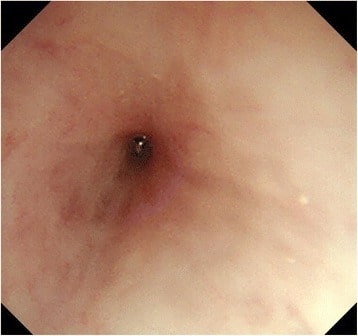Playlist
Show Playlist
Hide Playlist
Oropharyngeal Dysphagia
-
Slides GD Esophagus.pdf
-
Download Lecture Overview
00:01 Oro-Pharyngeal Dysphagia. 00:04 You’re having a hard time getting the bolus from the mouth into the pharynx. 00:09 Why? Nerve damage. 00:13 Think of Amyotrophic Lateral Sclerosis; you take a cotton swab, go to the back of the neck, but you don’t have a gag reflex, right? Neural issues; ALS, diabetic neuropathy. 00:29 My topic, oro-pharygeal dysphagia, that clear? You literally can’t even get the food or bolus from mouth into the esophagus. 00:37 This is where you are, in this region. 00:41 Symptoms are coughing, regurgitation and choking because you can’t get it into your esophagus. 00:45 Look for the patient keeping the food here. 00:50 Okay? Because they can’t get it into the esophagus. 00:53 They’re not trying to be annoying. 00:55 They just can’t. 00:56 Now, because you can’t get it into the esophagus, often times you may get it into the wrong tube. 01:04 Instead of getting it into the posterior esophagus, you get into the anterior trachea and if you get it in there often enough, your patient often times with ALS or nerve damage, they will suffer from aspiration pneumonia. 01:20 Video-fluoroscopy can show the structural lesion. 01:24 Work-up for CNS lesions; stroke, multiple sclerosis, Lou Gehrig, Parkinson, myasthenia gravis - all wonderful differentials that you want to keep in mind if you’re thinking about a patient who’s not able to get food from the mouth into the pharynx.
About the Lecture
The lecture Oropharyngeal Dysphagia by Carlo Raj, MD is from the course Esophageal Disease: Basic Principles with Carlo Raj.
Included Quiz Questions
A 65-year-old man presents to the physician's office with a 3-month history of difficulty swallowing, sometimes accompanied by severe coughing and choking. He also admits to having difficulty walking for the past several months. A chest X-ray shows a consolidated area in the lungs. Which of the following would be the BEST initial approach to determine the cause of this patient's symptoms?
- A workup for CNS lesions, including CVA, MS, ALS, Parkinson's disease, and myasthenia gravis
- Manometry of the esophagus
- Barium swallow
- CT scan of the brain done immediately, before taking the history and performing a physical examination
- Upper endoscopy
Which of the following would be the BEST test to detect structural or neuromuscular lesions causing oro-pharyngeal dysphagia?
- Videofluoroscopy
- Barium swallow
- Chest X-ray
- CT scan of the chest
- Esophageal manometry
Customer reviews
3,0 of 5 stars
| 5 Stars |
|
0 |
| 4 Stars |
|
0 |
| 3 Stars |
|
1 |
| 2 Stars |
|
0 |
| 1 Star |
|
0 |
There are many more symptoms of oropharyngeal dysphagia than those mentioned (e.g. increased chewing time, inability to form bolus etc.). Also, referral to speech pathology would provide additional insight into the patient's dysphagia.




